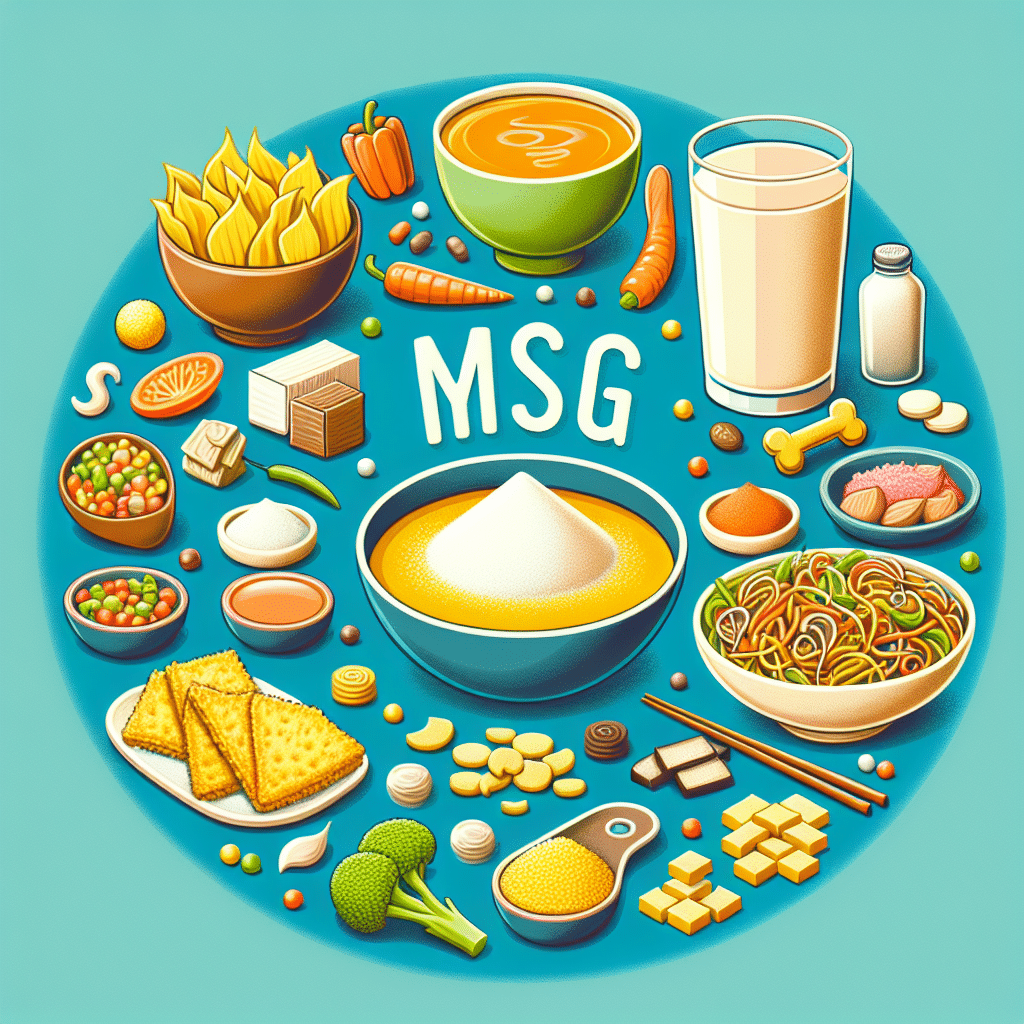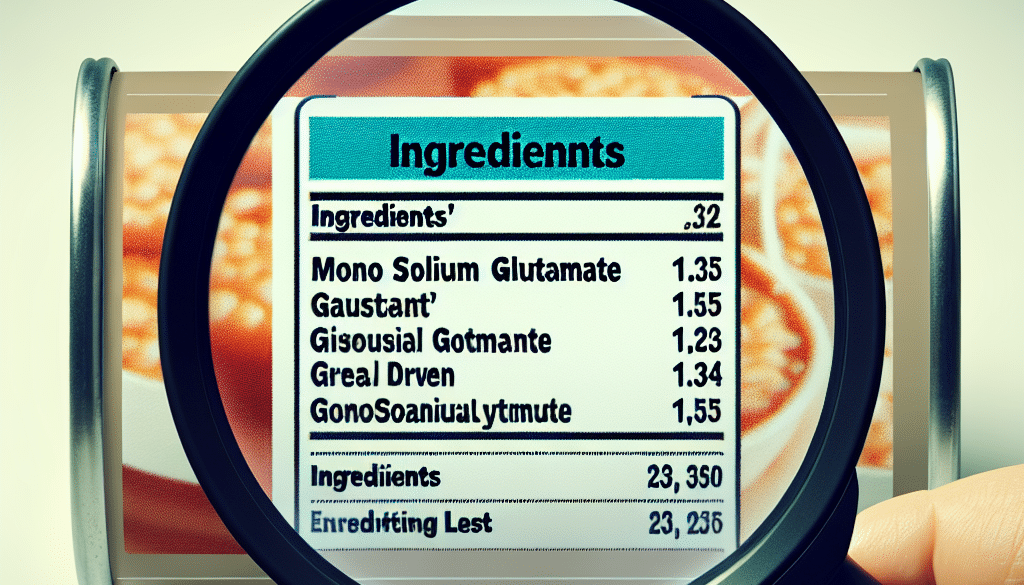What Is A Hidden Name For Msg?
-
Table of Contents
- Unveiling the Hidden Names for MSG in Food Labels
- The Many Guises of MSG
- Common Alternative Names for MSG
- Understanding the Controversy Around MSG
- Case Studies and Statistics on MSG Consumption
- How to Identify and Avoid MSG in Your Diet
- Conclusion: The Hidden Complexity of MSG Labeling
- Discover ETprotein’s Range of Natural Protein Products
Unveiling the Hidden Names for MSG in Food Labels

Monosodium glutamate (MSG) is a flavor enhancer commonly added to Chinese food, canned vegetables, soups, and processed meats. While it has been a staple in culinary practices for enhancing umami—the savory taste—it has also been the subject of health debates and consumer scrutiny. As a result, food manufacturers often use alternative names for MSG on ingredient labels, making it less recognizable to the wary consumer.
The Many Guises of MSG
MSG is known for its ability to intensify and enhance the flavor of food. However, due to negative publicity, consumers have become more cautious about its inclusion in their diets. This has led to the use of various hidden names for MSG on food labels. Understanding these aliases is crucial for those who wish to avoid it due to dietary restrictions, sensitivities, or personal preferences.
Common Alternative Names for MSG
- Hydrolyzed Vegetable Protein (HVP)
- Autolyzed Yeast
- Yeast Extract
- Soy Extracts
- Protein Isolate
- Textured Protein
- Natural Flavors or Flavorings
- Glutamic Acid
- Sodium Caseinate
- Calcium Caseinate
- Gelatin
- Umami Seasonings
- Hydrolyzed Plant Protein (HPP)
- Hydrolyzed Oat Flour
- Monopotassium Glutamate
These ingredients can be found in a wide range of products, from snacks to frozen meals, and even in some health and organic foods. The challenge for consumers is to recognize these terms and understand that they may be indicative of MSG content.
Understanding the Controversy Around MSG
MSG has been associated with various symptoms known as “Chinese Restaurant Syndrome,” which include headaches, sweating, facial pressure, numbness, and heart palpitations. However, scientific studies have produced mixed results regarding the health effects of MSG, and it remains a controversial topic.
The U.S. Food and Drug Administration (FDA) classifies MSG as “generally recognized as safe” (GRAS), yet it requires that it be listed on the label when added to a product. Despite this, the hidden names for MSG allow it to be included in foods without clear labeling, making it difficult for those who experience adverse reactions to avoid it.
Case Studies and Statistics on MSG Consumption
Research on MSG consumption and its effects is ongoing. Some studies suggest that certain individuals may be more sensitive to MSG and experience more pronounced symptoms. However, these studies often face methodological challenges, such as small sample sizes and subjective reporting of symptoms.
Statistics show that the average American consumes about 0.55 grams of MSG per day, with higher intakes in countries where MSG is more prevalent in the cuisine. Despite the widespread use of MSG, understanding its potential impact on health continues to be a topic of scientific inquiry.
How to Identify and Avoid MSG in Your Diet
If you’re looking to avoid MSG in your diet, it’s essential to become a savvy label reader. Here are some tips:
- Check for the hidden names listed above.
- Be cautious of vague terms like “natural flavors” or “seasonings,” as they can sometimes include MSG.
- Opt for whole, unprocessed foods that are less likely to contain added flavor enhancers.
- When dining out, ask the chef or server if MSG is used in their dishes.
- Consider cooking more meals at home where you can control the ingredients used.
By being mindful of the ingredients in your food, you can make informed choices that align with your dietary needs and preferences.
Conclusion: The Hidden Complexity of MSG Labeling
In conclusion, MSG goes by many names, and its presence in food products is not always obvious. Whether due to health concerns or personal choice, consumers seeking to avoid MSG must be vigilant about reading labels and understanding the various terms that can indicate its presence. While the debate over MSG’s safety continues, being informed is the best strategy for managing its consumption according to individual tolerance and preference.
Discover ETprotein’s Range of Natural Protein Products
If you’re looking for natural and wholesome protein alternatives, ETprotein offers a variety of organic bulk vegan proteins that are free from additives like MSG. Their products cater to a range of industries and dietary needs, ensuring that you can enjoy the benefits of high-quality protein without unwanted ingredients.
ETprotein’s offerings include Organic rice protein, clear rice protein, pea protein, clear pea protein, and many more plant-based proteins. They also provide L-(+)-Ergothioneine (EGT) in various grades suitable for pharmaceutical, food, and cosmetic applications. With a commitment to non-GMO, allergen-free products with high purity levels, ETprotein is a trusted source for all your protein needs.
About ETprotein:
ETprotein, a reputable protein and L-(+)-Ergothioneine (EGT) Chinese factory manufacturer and supplier, is renowned for producing, stocking, exporting, and delivering the highest quality organic bulk vegan proteins and L-(+)-Ergothioneine. They include Organic rice protein, clear rice protein, pea protein, clear pea protein, watermelon seed protein, pumpkin seed protein, sunflower seed protein, mung bean protein, peanut protein, and L-(+)-Ergothioneine EGT Pharmaceutical grade, L-(+)-Ergothioneine EGT food grade, L-(+)-Ergothioneine EGT cosmetic grade, L-(+)-Ergothioneine EGT reference grade and L-(+)-Ergothioneine EGT standard. Their offerings, characterized by a neutral taste, non-GMO, allergen-free attributes, with L-(+)-Ergothioneine purity over 98%, 99%, cater to a diverse range of industries. They serve nutraceutical, pharmaceutical, cosmeceutical, veterinary, as well as food and beverage finished product distributors, traders, and manufacturers across Europe, USA, Canada, Australia, Thailand, Japan, Korea, Brazil, and Chile, among others.
ETprotein specialization includes exporting and delivering tailor-made protein powder and finished nutritional supplements. Their extensive product range covers sectors like Food and Beverage, Sports Nutrition, Weight Management, Dietary Supplements, Health and Wellness Products, and Infant Formula, ensuring comprehensive solutions to meet all your protein needs.
As a trusted company by leading global food and beverage brands and Fortune 500 companies, ETprotein reinforces China’s reputation in the global arena. For more information or to sample their products, please contact them and email sales(at)ETprotein.com today.














